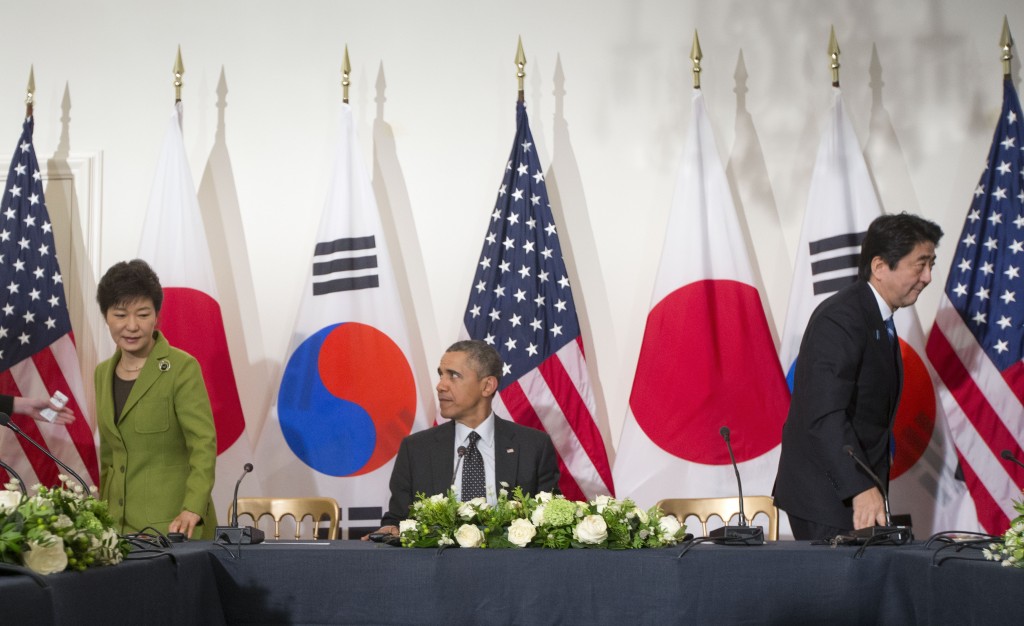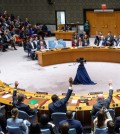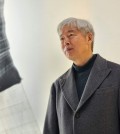- California Assembly OKs highest minimum wage in nation
- S. Korea unveils first graphic cigarette warnings
- US joins with South Korea, Japan in bid to deter North Korea
- LPGA golfer Chun In-gee finally back in action
- S. Korea won’t be top seed in final World Cup qualification round
- US men’s soccer misses 2nd straight Olympics
- US back on track in qualifying with 4-0 win over Guatemala
- High-intensity workout injuries spawn cottage industry
- CDC expands range of Zika mosquitoes into parts of Northeast
- Who knew? ‘The Walking Dead’ is helping families connect
Irreconcilable Differences?
S. Korea and Japan have long way to go to repair ties

President Barack Obama watches as South Korean President Park Geun-hye, left, and Japanese Prime Minister Shinzo Abe, leave their seats at the opposite ends of the table, Tuesday, March 25, 2014, during the start of their trilateral meeting at the US Ambassador’s Residence in the Hague, Netherlands. (AP Photo/Pablo Martinez Monsivais)
By Chang Jae-soon
(Yonhap) — U.S. President Barack Obama successfully played the role of a dialogue broker between South Korean President Park Geun-hye and Japanese Prime Minister Shinzo Abe on Tuesday, but his efforts are unlikely to lead to any immediate warming of chilly relations between the two American allies.
Park and Abe shook hands with smiles on their faces amid a barrage of camera flashes as they greeted each other in the Washington-brokered three-way talks with U.S. President Barack Obama on the sidelines of the Nuclear Security Summit in The Hague on Tuesday.
“President Park Geun-hye, it is nice to meet you today,” Abe said in Korean language in his opening remarks at the meeting, a gesture of friendship demonstrating that he wants, at least superficially, to improve frayed relations with South Korea.
The meeting represented the first formal talks between Park and Abe since they took office more than a year ago. Park has avoided a meeting with Abe in protest of Japan’s stance on issues related to the country’s 1910-45 colonial rule of Korea.
What bound the three together was North Korea.
All three leaders stressed the importance of working closely together to end Pyongyang’s nuclear program. They also agreed to convene a meeting of their chief nuclear negotiators soon to cement cooperation in dealing with the nuclear standoff, officials said.
No history issues were raised during the meeting.
Relations between South Korea and Japan have been at one of their worst points in recent years due to Tokyo’s refusal to address its forced recruitment of Korean women into sexual slavery during World War II and its repeated claims to the South’s easternmost islets of Dokdo.
The government of Prime Minister Abe has also taken a series of steps that raised questions about whether Japan is remorseful about its imperialist past. In December, Abe paid a much-denounced visit to a war shrine that honors Japan’s war dead, including 14 Class A war criminals.
Frayed relations between Seoul and Tokyo have been a cause for concern for the U.S. as Washington seeks to build three-way security cooperation with the two allies in an effort to keep a rising China in check. The U.S. has pressured Seoul and Tokyo to come to terms with each other, especially before Obama’s Asia trip next month.
Experts say the meeting itself was meaningful in that Seoul and Tokyo reaffirmed their commitment to cooperation on security issues at a time when North Korea is saber-rattling with missile and rocket launches, but the two neighbors still have a long way to go to repair relations.
“Korea-Japan relations can be tumultuous as there are many obstacles ahead,” said Hong Hyun-ik, a senior analyst at South Korea’s Sejong Institute think tank, referring to a series of history issues that could freeze the hard-won atmosphere of reconciliation at any time.
“Japan appears to have made the conciliatory gesture in order to avoid isolation, but I don’t see much sincerity,” he said. “In the future, South Korea and Japan should reset their relations, but they have a long way to go.”
Relations between Seoul and Tokyo had been bad even before Park and Abe became leaders. Their meeting in the Dutch city marked the first summit between the two countries in nearly two years, an unusually long break that shows how badly ties have been strained.
Tuesday’s meeting was set up after Abe promised earlier this month to honor Japan’s two previous apologies for its colonial rule — known as the “Kono Statement” and the “Murayama Statement.” Park welcomed the pledge, saying she hopes it will lead to better ties between the two countries.
Park’s agreement to meet with Abe in a three-way meeting involving Obama, but not one-on-one, showed that Park believes Abe’s promise to stand by the apology statements is a positive step but that Japan should do more to realize a bilateral summit.
South Korea’s No. 1 demand of Japan to mend ties has been for Tokyo to take steps to resolve the long-running grievances of elderly Korean women who were forced by Japanese colonial rulers to provide sex for the country’s troops during World War II.
South Korea has said the issue is becoming increasingly urgent as most victims are well over 80 years old and may die before they receive compensation or an apology from Japan.
Japan has rejected the demand, saying all colonial-era issues were resolved in a 1965 compensation deal under which the two countries normalized their relations.
Park says Japan must take steps to show it is serious about improving relations with Seoul.
In an interview with the German newspaper Frankfurter Allgemeine, Park said it was good that Abe promised to uphold the apology statements, but she stressed that Japan should do more to demonstrate its sincerity, including resolving the sexual slavery issue.
“I think that what is important now is sincerity,” Park said in the interview published Tuesday ahead of her state visit to Germany. “The Japanese government should take sincere measures to rebuild mutual trust.”
Park also said that she proposed making a joint history textbook among Northeast Asian nations to overcome history rows, just as Germany and other nations did after World War II, but the proposal has since seen no progress.
She also urged Japan to learn from Germany and make greater efforts to reconcile with its neighbors.















